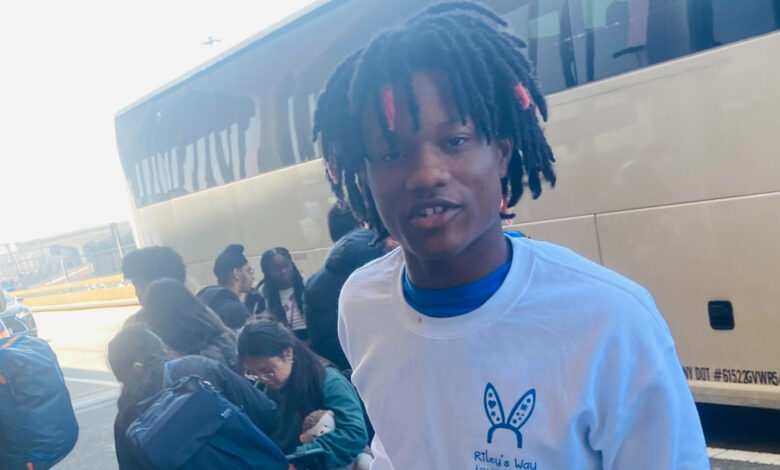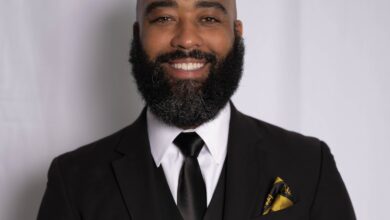Inside One Black Mom’s Fight Against Expulsion in Fulton County – Capital B News

Back in January, Zaire Byrd, then a junior at Tri-Cities High School, got into a fight with a few other boys after school. Per the Fulton County Schools student code of conduct, all the boys received an automatic 10-day suspension pending investigation and disciplinary hearings.
Following the disciplinary hearings, each of the boys was given a long-term suspension. For Zaire, this meant finishing the school year at Peak Academy, a privately owned alternative school contracted by FCS, so that he could remain on track for graduation.
For a student with no prior disciplinary record, one fight doesn’t have to mean changing schools in the middle of the year. But Zaire’s situation reveals a larger trend of how Black students often face harsher disciplinary action than non-Black students. This nationwide trend is a symptom of the school-to-prison pipeline, a set of policies that often begins with infractions like fighting or classroom disruption but can quickly lead to law enforcement referrals and ultimately drive minority and low-income youth into the criminal legal system.
“It was basically like a jail,” Zaire said of alternative school. “We couldn’t talk while we was moving in between classes.” Every morning, he said, students had to empty their pockets, including cell phones, into a bag that they wouldn’t get back until the end of the school day.
Across the country, conservative “parents’ rights” groups are cajoling school boards and educators around issues like critical race theory and gender identity in schools. Meanwhile, Black parents like DeAndrea Byrd, Zaire’s mother, are faced with the challenge of protecting their children from being criminalized or otherwise harmed in educational settings without the backing of a well-organized advocacy group.
Zaire now attends Benjamin Banneker High School because he was kicked out of the performing arts magnet program that allowed him to enroll in Tri-Cities.
“Although Banneker is our home school, that’s not where his community was. The people that he knows, his friends, his teachers, his coaches, the people that he trusted,” said DeAndrea Byrd. And Zaire’s expulsion was only the beginning of her journey through the maze that is the school discipline and appeals process.
Navigating the intricacies of school discipline
Zaire has been diagnosed with attention-deficit/hyperactivity disorder. As a student with a 504 plan — a specialized individual education program, or IEP, for students with documented disabilities — Zaire was entitled to a separate disciplinary hearing with the district’s Section 504 coordinator. DeAndrea Byrd says the separate hearing never happened.
The school disciplinary process, as laid out in the district’s code of conduct, details what happens after it’s determined that a student broke a rule. First, the principal or designated administrator will notify them of the charges, and they will be given an opportunity to present their side of the story.
There are four tiers of misconduct, which classify the severity of a student’s behavior and provide a guideline for how that student can be punished. A group fight is classified in the fourth and most serious tier, which triggers a series of consequences: notification of a parent or guardian, an automatic 10-day, out-of-school suspension, and a disciplinary hearing.
At the disciplinary hearing, the district requires that parents be given the opportunity to advocate on behalf of their child.
DeAndrea Byrd described the entire process as being driven by a single administrator, whose behavior prompted her to contact the principal.
“I told her I didn’t feel comfortable to still having to deal with [this administrator] because this was a woman that slammed the door in my face, yelled at me and teared papers out of my hand, but they repeatedly sent me back to the person that was unprofessional with me, and she was able to lead every decision in my son’s case,” Byrd said.
Fulton County Schools declined to comment on Zaire’s case, citing federal privacy laws, and Capital B Atlanta was not able to independently confirm Byrd’s account.
“I never said that he shouldn’t be suspended, because we don’t condone violence, but what she did was take an excessive stand on somebody that had no prior disciplinary record, whose teachers and coaches wanted him to come back,” DeAndrea Byrd said.
Throughout the process, Zaire’s mother was in contact with Sterling Johnson, just opportunity director at Partnership for Southern Equity, an organization that works around racial justice in Atlanta and across the South. Johnson attended disciplinary hearings with the Byrd family and helped to organize a strategy to advocate for Zaire’s best interests.
“The trends are nationwide about how Black students are being criminalized and punished even more than their white counterparts,” Johnson said.
Ahead of Zaire’s disciplinary hearing, DeAndrea Byrd said she asked the school for surveillance footage of the fight, but was denied. She also tried to subpoena students and teachers who could speak on her son’s behalf.
“I made a list of students and teachers. They told me they didn’t have to subpoena them, but that they could in fact subpoena us to come to tribunal,” she said. She was told to file an open records request to get a copy of the nurse’s report made after the fight.
More distressing was the confusion around where Zaire would finish high school.
DeAndrea Byrd said she was initially told by the school that Zaire would finish the year at Peak Academy, with the understanding he would return to Tri-Cities for his senior year.
“And then at the 11th hour, literally two weeks before school started, the same administrator made the decision to [keep Zaire out of] Tri-Cities,” Johnson said.
Barriers to parental involvement
For many parents, the resources and time it takes to be an active participant in the disciplinary process are out of reach.
KaCey Venning, co-founder and executive director of Atlanta-based nonprofit HEY! (Helping Empower Youth), told Capital B Atlanta that her organization receives many requests from parents who lack the time or financial resources to deal with the complex disciplinary process.
“Because so many of our parents work hourly jobs, they don’t have the ability to take off a half a day or a full day to just try and get answers on behalf of their children,” Venning said. “And so many times before they’re able to actually get to the bottom of something, a final informal decision has already been made.”
But even in situations like Zaire’s, where a parent is present and engaged, they can face obstacles when they try to advocate for their child. In some instances, parents say administrators make the whole process difficult, which carries over if the parent tries to appeal an initial decision.
In Fulton County, parents have 20 days to file a written notice of appeal, which then must be approved by the superintendent; the school board has 10 business days to discuss and make a decision. The Byrds went through that process with the help of the National Parents Union, but her appeal failed nonetheless. Zaire wasn’t allowed back to Tri-Cities.
Oftentimes once the disciplinary judgment is made, parents accept administrators’ decision.
“A lot of times, because parents don’t have the resources, be it the language to use, understanding the chain of command, or quite honestly, the time,” they never submit an appeal, Venning said.
But she said her experience highlights barriers families face in navigating school discipline and advocating for their kids.
“Parents and students should have rights. We need to have input. There needs to be an advisory board or some checks and balances from the community when these people are able to make decisions and there needs to be accountability,” she said.
Criminalizing Black kids
More than just their academic future is at stake for a lot of Black students caught in the school disciplinary process.
Data compiled from the U.S. Department of Education’s Office for Civil Rights found that for the 2017-2018 school year, Black boys were 2.65 times more likely to be suspended than white boys and Black girls were over four times as likely to be suspended than white girls. Fulton County Schools are 41% Black, but Black students made up 78.8% of out-of-school suspensions and 87.8% of expulsions in 2022, according to data from the Governor’s Office of Student Achievement.
“Our schools are actively conditioning students of color to be a part of this system moving forward,” Johnson said.
Experts say removing a student with behavior issues from school is often not an effective solution and can lead to some serious consequences later. Students who get suspended or expelled are more likely to fall behind, particularly in math and reading, and are more likely to fail a grade, according to data from the Learning Policy Institute.
“We know that the harsh punishments don’t particularly enhance the quality of the school environment or stop these behaviors,” said Morehouse College professor of STEM education Justin Ballenger.
Ballenger advocates that positive behavioral intervention and supports be used in schools in place of punitive measures.
PBIS involves a number of preventative measures, including involving a student’s family and community members to create “culturally responsive practices” and uses data to monitor progress while identifying places for improvement.
Ballenger said school staff have a critical role to play, which should involve engaging with students to assess the root of disciplinary issues and planning for their productive return to the classroom. His work involves connecting local schools with Morehouse education students to provide positive role models for kids.
A spokesperson for FCS acknowledged that there are improvements to be made in the disciplinary process but emphasized that the district is committed to making positive changes and pointed to the Georgia Department of Education’s PBIS recognition program.
In September, 26 of the district’s 106 schools were recognized for implementing PBIS at a distinguished level. Only one high school made the list, Northview High School in Johns Creek, which was less than 10% Black in 2022.
In Fulton County Schools, 42.4% of students are classified as Black or African American, while 25.8% are white and 15.9% are Hispanic of any race, according to the U.S. Department of Education’s Office of Civil Rights’ most recent data. But of all students who received referrals to law enforcement for disciplinary problems, 62.8% were Black, 18.2% were Hispanic or Latino, and 13.6% were white, according to the data.
Looking forward
Now, halfway through his senior year, Zaire is preparing for the next chapter in his life.
He’s applying to colleges and is looking into studying cybersecurity and photography, and has started working on a documentary featuring other kids who have been suspended or expelled from school. He wants to advocate for an end to zero-tolerance policies that can be used to give a harsh punishment even if it’s a student’s first offense.
Even though Zaire is the type to “make lemons out of lemonade,” his mother knows this ordeal has affected him. Zaire admits things haven’t been easy. He’s been in weekly therapy sessions to help him cope with the changes he’s gone through in the past year.
“It stressed me out, and also it took away a lot of my opportunities,” Zaire said of his experience. “I had to move away from a lot of my friends, too. That was just stressful.”
Read More



